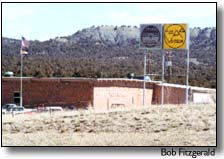|
May 17, 2001
by Aspen C. Emmett The recent proposal to merge San Juan Basin Technical School and Pueblo Community College into one full-service community college has received two thumbs-up from the schools’ advisory committees and local businesses. In an effort to ease tight budgets and add to the educational options in the area, administrators of both schools have put forth the option of combining the institutions. At the monthly meeting of the technical school’s board of controls on Monday night, discussion focused on feedback from representatives of interested parties. "We’ve done quite a bit of discussion in both the advisory group as well as the community at large, and No. 1, the overwhelming consensus is ‘Go for it,’" said Dan Avery with the business and marketing advisory committee, who was also representing the local business community and the Cortez Area Chamber of Commerce. "There probably will be a lot of problems and there will be times when you will bang your head against the post and say, ‘What are we doing next?’ But for the community as a whole, that’s what we need — that’s the direction we need to go at." Avery said the shift to a full-service community college that offers both academic and technology programs would better serve employers and potential employees as well as offering a stepping-stone for students who want to progress to four-year institutions. "From an economic-development standpoint it’s something to be able to point to," Avery said. "It’s not just about training our young people for here. We have to think about our young people that are going to go somewhere else — that they can leave Montezuma County with a good solid education either to go on to a four-year or to go to work in a corporation, or a lab or a hospital with a good foundation they’ve gotten from a good state school." Representatives from the welding, nursing, agricultural business, diesel/ heavy-machinery, business/technical, broadcasting and electronic advisory committees also expressed their support of the proposed community college. The only department not in support of the merger was industrial mechanics, which wanted the schools to "leave well enough alone." Although a department representative was not in attendance at the meeting, the advisory committee relayed its opposition through the vo-tech’s executive director, Bill Lewis. "They’re not in favor of having this community college," he said. Lewis explained that the opposing committee felt that its program would not benefit from a merger. Bob Frank of Weminuche Construction expressed his support for the community-college concept from an employer’s standpoint. He emphasized that the transition required community input and backing. "If you don’t have strong community support, it’s not going to work," Frank said. Although everyone in attendance was clearly in support of the merger, some persons expressed concerns about the shift from local to state control and how current school employees and programs would be affected. "Don’t lose the certificate programs," Avery said. "There’s a lot of need for that kind of program and that can be worked into that same ball of wax." Avery also shared his take on how new control would affect the system. "I don’t think there’s any concern about which part of the state controls what — that’s the way community colleges operate. We’re not doing anything different." Board members said the shift would only happen if there was a strong support from the community. "It was made clear to us that if there is to be a community college in this area, the desire would have to be known from the community," Sue Baacke said. PCC Director Kathy Rousset told the Journal that Monday’s meeting follows discussions at last month’s board meeting in which the advisory committees were informed of the merger proposal and asked to consult the individual departments. "They each met with their own advisory committee from each department and then the chairpersons were requested to return (Monday) with the consensus from their committee about what they wanted to do next," Rousset said. The next step, Rousset said, is to explore what other effects a merger might bring about. "One of the issues of high concern to the vo-tech and PCC is that people continue to receive the services they need," she said. "And if this drops off when a merger happens, then we don’t want to do that." |
||
|
Copyright © 2001 the Cortez Journal.
All rights reserved. |
